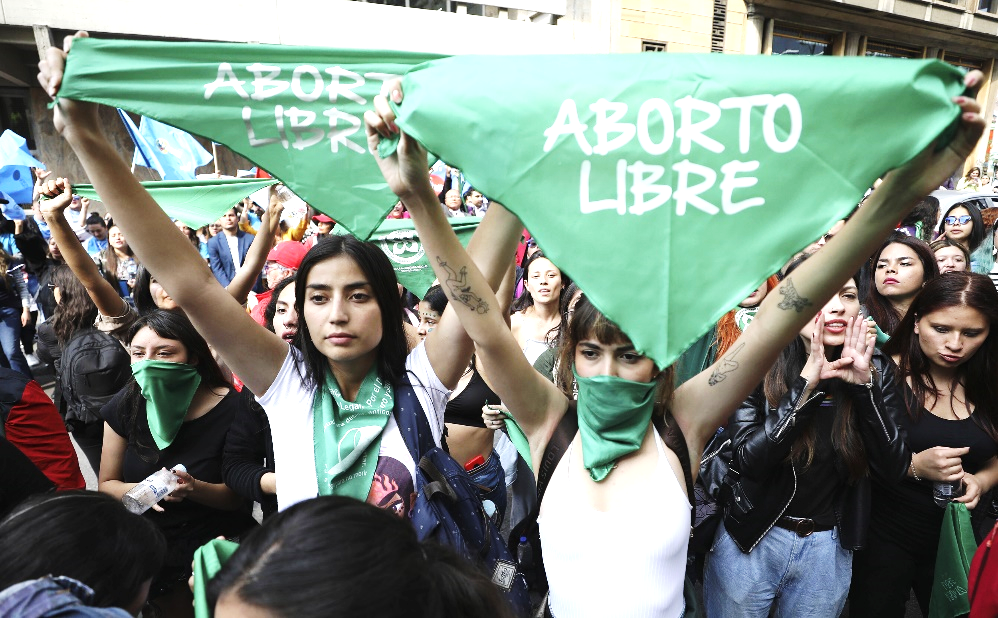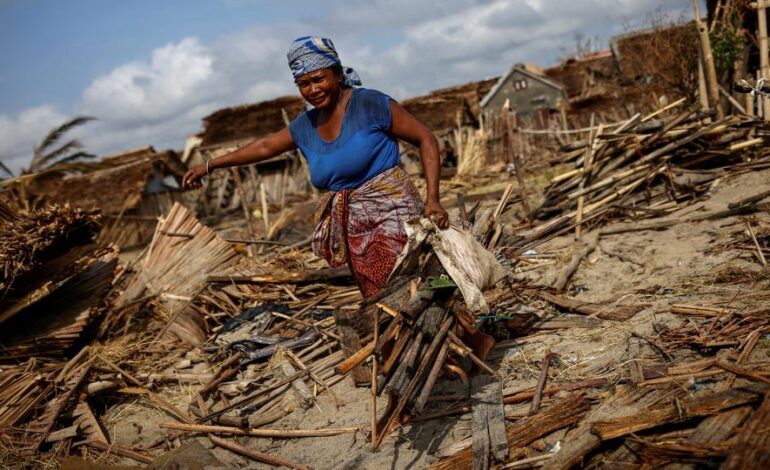
Avellon Williams
BOGOTA, COLOMBIA – As a sea of green handkerchiefs swirled around Colombia’s Constitutional Court building on Monday, protesters chanted and echoed “Ya es ley” (now is law) in unison.
The court decriminalized abortion procedures up to 24 weeks of gestation, ensuring greater access to abortion in the largely Catholic country.

Throughout Colombia’s history, abortions have only been legal under three circumstances: if the mother’s life is endangered, if the pregnancy is a result of rape, or if the fetus is fatally deformed. The same three exceptions apply after 24 weeks.
“In Colombia, there is not a single woman who hasn’t had to undergo a clandestine abortion,” said Marisol Rivera, 29, who stood outside the courthouse Monday with a handkerchief symbolic of the pro-choice movement.
“But little-by-little, we’re changing that.”
This case occurred amid an emerging feminist “green wave” in Latin America, symbolizing the bright green bandanas worn by pro-choice advocates.
As a result of decades of feminist activism in the region, the recent wave gained traction in Argentina, which passed a law legalising abortion in December 2020, and Mexico, which decriminalised abortion in September.
As a result, Ecuador recently decriminalized abortion in situations where rape has occurred as well.
As other Latin American countries consider similar cases, advocates said the decision is a major step forward for women’s rights in the region.
According to Paula Avila-Guillen, executive director of Women’s Equality Center, “It is an awakening of women’s rights.”.
She explains “We’ve arrived at a moment in which we were tired of being left behind and just started reclaiming our rights. For many years we were just waiting.”

Former President Alvaro Uribe and other anti-abortion groups blasted the ruling, with Uribe tweeting that “it offended Colombia’s highest group of citizens.”
Jose Jaime Uscátegui, a conservative congressman, tweeted a video standing outside the court throwing toilet paper rolls at the court building.
“This is a crime. Why do Colombian citizens have to sit here silent … while five judges make a decision on behalf of 50 million Colombians,” he said in the video.
The Colombian case was based on a lawsuit filed by an umbrella group of 100 organisations called Causa Justa por el Aborto(“Just Cause for Abortion”), which sought to have abortions removed from Colombia’s criminal code and instead regulated under health laws.
There was previously a possibility that women could spend anywhere from 16 to 54 months in prison for interrupting a pregnancy that did not fall under the three exceptions.
In the South American country, the procedure was banned for decades.
At the age of 18, Beatriz Quintero, co-founder of La Mesa por la Vida y la Salud de las Mujeres (“Table for Life and Health of Women”), one of the organisations that signed on to the case, had a clandestine abortion when the procedure was criminalisedin the 1970s.

The now 69-year-old Internero said she was lucky to have sanitary conditions during her procedure, but she was scared knowing she could face charges and that there were no safety guarantees.
Many women’s abortions do not take place under the same conditions, she said, and they suffer because of it.
“Some women scrape together resources, hide them from their families, and have no support.”
Guttmacher Institute data shows that 760,000 women are treated annually for complications resulting from clandestine abortions in Latin America. Among these women, one in 10 maternal deaths results from such abortions.
Under the three conditions above, Colombia’s Constitutional Court overturned the ban in 2006 and decriminalised abortions partially. Colombia’s laws initially appeared to be more liberal than those of its neighbours.
In poorer and rural areas, women face a labyrinth of legal and physical obstacles, as well as stigmatisation.
In left-leaning urban centers like Bogota, women can access the procedure more easily, whereas, in more conservative rural areas, women are often entirely unaware of their rights and restrictions are more rigid.
There is concern that access and enforcement of regulations will continue to be split down that divide.
Casa Justa reports that most abortions performed in Colombia are carried out clandestinely, putting women at risk.

The number of crimes involving abortion has vastly increased since the law was changed in 2006, according to a recent report from La Mesa por la Viday la Salud. Abortion crimes increased to 320 per cent from 130 in 2005, when there was still a total ban, to 416 in 2018.
The report said minors and women from rural areas were disproportionately criminalised, and that at least 42 percent of those prosecuted suffered gender-based violence.
This court decision is a symbolic step forward for the region, which could ripple into countries like Chile, where abortion is highly regulated, and where the incoming president, Gabriel Boris, has promised to make it available without restrictions.
In Colombia and much of the region, this issue remains divisive.
Approximately 60 percent of Colombians support legalizing abortion, but only a fourth believe it should be done without limitations like the ones currently in place, according to a September IPSOS poll.
Ivan Duque, the country’s right-wing president, said in 2010 when the court was considering another abortion case that maintained previous law that expanding abortion access would be a “very hard change.”
“I’m pro-life. I believe life starts at conception,” he said.
Even though it has been legalised in Argentina, many doctors there have refused to perform the procedure in the country for moral reasons; observers wonder whether the same could happen in Colombia or Mexico.

Regardless of the laws, there will always be a doctor who will exercise conscientious objection, says Paula Avila-Guillen of the Women’s Equality Center.
Despite that, for Quintero, who had a clandestine abortion decades ago, the decision represents a sign of change not only in her own country but also across the region.
“These decisions demonstrate that the world is moving forward,” Quintero said.





Recent Comments